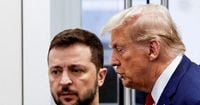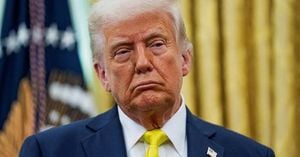In a significant diplomatic move, the United States has proposed a detailed peace plan aimed at resolving the ongoing conflict between Russia and Ukraine. According to Bloomberg, the plan includes provisions that would allow Russia to maintain control over territories it currently occupies in Ukraine, while also easing sanctions against Moscow.
This proposal was revealed shortly after a series of ceasefire talks held in Paris, France, involving officials from Europe, Ukraine, and the United States. During these discussions, U.S. officials expressed their intent to achieve a complete ceasefire in Ukraine within a matter of weeks.
The U.S. plan notably seeks to freeze the conflict and does not entertain Ukraine's aspirations to join NATO. This aspect of the proposal has raised eyebrows among various stakeholders, as it suggests a significant shift in the geopolitical landscape.
U.S. Special Envoy Steve Witkoff, who participated in the Paris negotiations, indicated that a potential peace deal could focus on the status of five key territories. These include the Crimean peninsula, which Russia annexed in 2014, as well as the Donetsk, Lugansk, Zaporizhia, and Kherson regions, which were declared annexed by Russia in 2022.
Witkoff reportedly informed President Donald Trump that granting Moscow "ownership" of these four regions could be the quickest route to achieving a ceasefire, according to Reuters. However, this suggestion has sparked controversy, particularly from Ukrainian President Volodymyr Zelensky, who accused Witkoff of overstepping his authority in discussing Ukrainian territory during these secretive talks.
Zelensky has consistently maintained that Ukraine will not recognize any regions controlled by Russia as part of any peace agreement. The Ukrainian leader's stance underscores the deep-seated tensions and complexities surrounding territorial claims in the region.
On April 11, Russian Foreign Minister Sergey Lavrov remarked that returning to the borders established in 1991, as demanded by Zelensky, is "impossible." Lavrov's comments reflect the entrenched positions on both sides, with the Trump administration acknowledging that both Ukraine and Russia must make concessions to reach a peace agreement.
Secretary of State Marco Rubio has echoed this sentiment, asserting that territorial concessions from Ukraine are a prerequisite for any peace deal. Rubio confirmed that recent negotiations between Ukraine and the U.S. in Saudi Arabia included discussions about these territorial concessions as part of a broader strategy to negotiate with Russia.
As the conflict has progressed, Russia has come to control approximately 20% of Ukrainian territory. The Trump administration has emphasized that Ukraine's hope of restoring its borders to their pre-2014 status is "unrealistic," further complicating the prospects for a resolution.
In a related development, the proposal discussed in Paris on April 17 also includes easing sanctions against Russia and abandoning Ukraine's NATO ambitions. However, sources indicate that this roadmap is still subject to discussion with Kiev and may not lead to a comprehensive resolution of the conflict.
European allies of Ukraine have expressed reservations about recognizing the territories in question as part of Russia, highlighting the challenges that lie ahead in achieving a consensus on the proposed plan.
During the meetings in Paris, Rubio and Witkoff met with French President Emmanuel Macron and held discussions with top officials from Germany, England, and Ukraine. The urgency of the situation was underscored when Rubio signaled that Washington might be prepared to "retreat" if a resolution to the conflict cannot be found within a few days.
Moreover, Russia has issued warnings regarding the feasibility of a comprehensive ceasefire, citing Ukraine's frequent violations of previous agreements. Russian Permanent Representative Vassily Nebenzia, speaking at UN headquarters, raised concerns about the difficulties in establishing a ceasefire, recalling the failed Minsk agreement that was allegedly exploited to arm Ukraine prior to the conflict.
Nebenzia further accused Ukraine of violating a recent 30-day ceasefire brokered by the U.S., which was intended to halt attacks on energy infrastructure. As the situation continues to evolve, the question of when a lasting ceasefire can be achieved remains uncertain.
In summary, the U.S. peace proposal represents a pivotal moment in the ongoing Russia-Ukraine conflict, with potential implications for regional stability and international relations. As discussions progress, the stakes are high for all parties involved, and the outcome will likely shape the future of Ukraine and its relationship with both Russia and the West.




